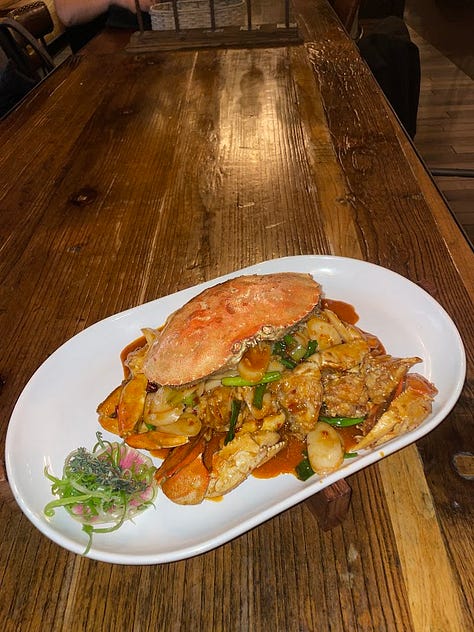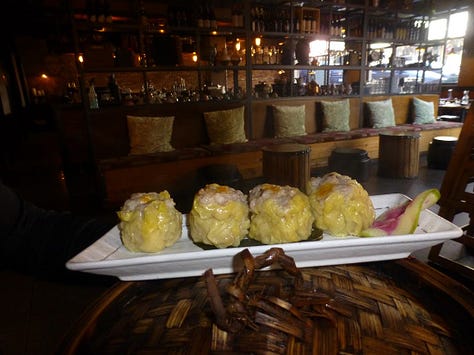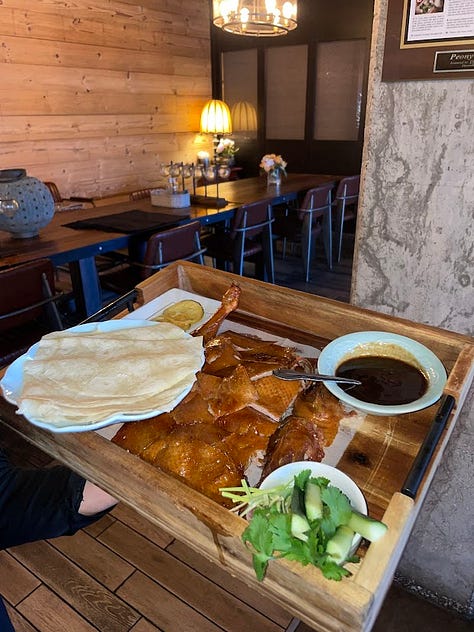“Hostess at a Chinese restaurant” is an unexpected line on my resume, but is one of my proudest.
A humdrum of chatter and jazz tunes fills the dimly lit, modern dining area. Coming from the back is the rhythmic beat of clanging pots and pans, the sizzle and crackle of stir-fried pork and tofu, the soft rumble of the live crab and lobsters jostling in the large aquarium. Make way as a petite expo brings out a sizable platter of crispy Peking duck, soft white pancakes, and thinly sliced cucumber.
Welcome to Peony Kitchen, a rustic-chic eatery with wood & exposed brick walls, serving Chinese fare with a contemporary twist.
Peony Kitchen has become a new home for me in the past few weeks, as I fight Bellevue Boredom by getting more involved in the food scene beyond just dining and writing reviews. The last time I had a service job was in 2020, when I dabbled in food delivery at Chowbus for a few weeks. After that, it was a fight to secure internships and prestige—from government bureaucracies to tech startups, consulting to marketing—but nothing “blue collar” as that is considered beneath the Georgetown image.
As a woman of color at a predominantly white institution with a pre-professional focus on law, business, and politics, I felt the urge to prove myself, believing that my competence was tied to my ability to secure offers from name-brand firms. Having chased all that (I took the LSAT, went through consulting recruiting, studied abroad at the London School of Economics, took the GMAT, etc.) and graduated a semester early, I finally had time to explore my passion for food, without worrying about risks or prestige.
I could’ve leveraged my expertise in marketing and strategy consulting to become involved in the food industry in a corporate office setting. However, I have decades to experience the office life and learn from incredible business professionals. Moreover, corporate work in the food industry is often an ivory tower. The best way to understand what makes a successful restaurant, and how to address chef and customer needs, is to get hands-on experience.
It’s all about attitude
On the first day of training, I realized neither the reputation from working at name-brand firms nor my Stata and R skills had any weight. It was back to the basics: Can I show up on time? Can I make small talk with customers? Can I stand for six hours on my feet?
Yet, just as I was beginning to think none of my past experiences mattered, I began to identify the transferable skills from business to restaurant work. During my internship at a startup, roles are not clearly defined, so I would often take the initiative to think about new projects to work on. Likewise, at a restaurant, sometimes people miss shifts or there are too much customers, so I’ll have to step out of my hostess role and help out a server. I also noticed that the Instagram lacked content, so I put on my marketing hat and began to manage the account.
Eventually, I began to see the skills that I could transfer in the other direction, from restaurant work to business. Being able to navigate ambiguity, handle emergencies, and deal with feedback—whether that be from a client, supervisor, or customer—are important in both business and customer service. The hard part for customer service is that the consequences can be blunt. No tips. An angry phone call. Each piece of negative feedback strengthens the muscle of resiliency: handle the situation with grace and empathy, learn from past mistakes, and carry on with a positive attitude.
Both are exhausting in their own ways. Although restaurant work itself isn’t mentally tasking, hours can seem long when you’re on your feet all the time. By contrast, consulting isn’t as physically demanding, but it certainly is draining if you’re running on little sleep and mentally stressed. Hence, it can be easy to be pessimistic when thinking about the long shift or day ahead. “Sunday evening…” my business professional friends say, with the same disappointment as my restaurant coworkers who say, “I want to go home” as soon as they’ve clocked in.
I’ve learned from my investment banker friend K to chase optimism. As a new analyst, he lacked technical competency but could contribute value by being a “happy virus,” bringing youthful vivacity to his team. This past January, he worked the longest out of any analyst, stepped in for his colleague who had to go on leave, and began receiving recognition for his actual work as well. Similarly, I try not to complain at work and when my coworkers let out their steam about a difficult customer, I’ll listen but never feed into the negativity. Instead, I say, “it’s over now, let’s just have a good rest of the day.”
Sometimes, one host can leave early and I’ll volunteer to stay later, both because my cohost will derive more utility from the extra rest and because I’ll be able to learn faster if I take on more responsibility. Also, it’s fun to get in early and hang out with the old Chinese chefs. I get to practice my Mandarin and interact with a demographic of people I’d never otherwise be exposed to.
Understand business from the inside
It took working at the restaurant to help me realize how important restaurant politics, location, and type of business are for its operations.
The chef is a keystone in determining the success of a restaurant. A successful chef brings in a network of servers and cooks and designs the menu to bring in customers. The restaurant that I work at used to have a very creative Chinese chef, but during the pandemic, the chef left to a different restaurant and consequently, the menu has become simplified and also has not changed in the past few years. Many of the previous Chinese cooks and servers left with that chef as well. When customers ask for a dish that was previously served at our restaurant, they’re unable to get it. It’s also hard to get returning customers when their is no menu novelty. This has implications for how a restaurant pays its workers. For instance, a restaurant can choose to use a percentage payment system to incentivize chefs to perform well and avoid the complexity of negotiating fixed wage rates.
Another important factor is the location of a restaurant, but in more ways than I had initially thought. One example from the restaurant that I work at is it is in a business district, so many of the customers dine there for corporate lunches and dinners, needing private rooms. Also, there has been the expansion of more Chinese restaurants (such as Dough Zone) in the area, and can take away our customers if they serve similar dishes.
Since my business experience is in marketing and consulting, I tend to automatically think about how to grow and scale a business. However, many restaurants are family-owned, which unlike franchisees, just want to maintain their current profit margins and act as a stable income for the family. They do not necessarily have people with business backgrounds, and are more risk-averse. Then again, the average American doesn’t think too much about the past or the future; they live day by day.
The restaurant is a training ground
Talking to some of the other workers has made me realize just how much I overthink, which is both a strength and a flaw. I think it’s good to strike a healthy equilibrium. My intellectual curiosity brings about a new dynamic to the team. I’ll ask questions to stimulate more critical thinking about their work and ambitions, share my business analysis about the restaurant industry, and even suggest initiatives such as influencer collaborations.
In this way, working a blue collar customer service job is a very humbling experience. Although the people couldn’t be any more different than the folks at my company, I think it’s a great training ground for my first year in consulting, which will also be humbling, but in a different way. I’ll be surrounded by people with just as high ambitions, if not higher, who are more competent and smarter than me. In both situations, the qualities that helped me stand out in college are no longer seen as special. Working in a restaurant is like if I had wings, but they were suddenly clipped, and I must walk like the rest of humanity. In consulting, I look around me and everyone is flying, some far higher than me.
Hence, “Hostess at a Chinese restaurant” is an unexpected line on my resume, but is one of my proudest. It has helped foster humility, helping me be more content living in the present and appreciating all the characteristics of myself that are not tied to my accolades.



Buffets & Potlucks & Restaurants, Oh My
This excerpt from Joel Golby’s essay in the collection, In the Kitchen: Essays on Food and Life, struck me:
But I think the real core of buffet, and what makes it such a cherished and magical treat, is the way it inverts the eating experience. When you go to a restaurant you are handed a menu and asked to read and imagine what you might eat. The Buffet attacks you with visual stimuli and asks you to reach into the outer reaches of your own hunger. The Menu is calm and composed and the pricing is there, by the side, in plain black-and-white. The Buffet asks you to pay before you even look at the food. You are not given a knife and fork: you are given tongs. You are given a small lifting device to ease out a plump square of lasagne. You are given a whole salad bar to totally ignore. You are given a glass and told you can fill it, forever, with Coke. The Buffet subverts anticipation by overwhelming you with choice. The Menu forces your greed through a proxy, a waiter or waitress. And when it comes down to it, the key difference is this: while the Menu asks you to eat for pleasure, the Buffet asks you to eat your fill to relieve the bin.
Restaurants were a rarity in my childhood. I have a handful of solid memories from the places we went to. We’d frequent them a couple of times before changing a venue as my parents gradually made their way up America’s income strata. Back when affordable Chinese restaurants were still scarce in my hometown, we’d splurge on Mongolian Hot Pot and Din Tai Fung when we had guests over, but when it was just our family, we’d settle for the dingey Lao Sze Chuan and Bamboo Garden—places you could raise your hand and yell “服务员!” (“waiter!”) across the restaurant and they’d shout right back at you. Lao Sze Chuan has since upgraded its facilities and Bamboo Garden has closed, but the holy grail of establishments still stands like a relic of the Great Wall: the Mandarin Buffet.
Entering a buffet was diving into a different dimension. We’d starve the entire day just for the occasion. Platter after platter cheap sushi rolls, potstickers, shellfish, and sesame balls, never having to worry about saving leftovers or washing dishes. Think the parents in Spirited Away who literally stuffed themselves until they turned into pigs.
For Chinese who grew up prior to its economic development—when my mother would eat the same scanty porridge every morning and throw it up before going to school, or my father would eat insects because there wasn’t any meat available—moderation doesn’t exist. When my grandpa went on his first cruise to Alaska, he gained 7 pounds from eating at the cruise buffet. The KPI for value was “how many calories of semi-expensive food can you get for the cheapest price possible.”
Understandably then, my dad—the biggest NPC (non-player character) I know—would wage a war against fine dining. Even decades of earning more than a six figure salary cannot shed his scarcity mentality. We’re not talking just about his upbringing, but generations of poverty and famine that are ingrained epigenetically in his bones. For instance, here’s his take on Japanese food: “It’s so expensive and you barely get full off of that seafood. It’s just rice and a bit of fish.” And during the phase where I refused to eat red meat, he couldn’t fathom why anyone would turn down such a luxury. (On another note, I feel like it’s a universal experience to go somewhere fancy with a dude and have a pleasurable experience, just to realize the guy is still starving and swallows an entire pizza afterward.)
Rather than buffets, I much prefer potlucks, where everyone gets to bring and try a bit of their own culture and heritage. It’s comparative advantage at its finest, like in the good old days when we would trade food with friends at lunch.
I think of my character as a potluck, an amalgamation of all the people I surround myself with. My brain comes from K, my willingness to talk with strangers comes from A, “basedness” from G, you name it. True satiety is knowing that, depending on the situation and my mood, I have a table brimming with personality dishes to fill up my plate.






